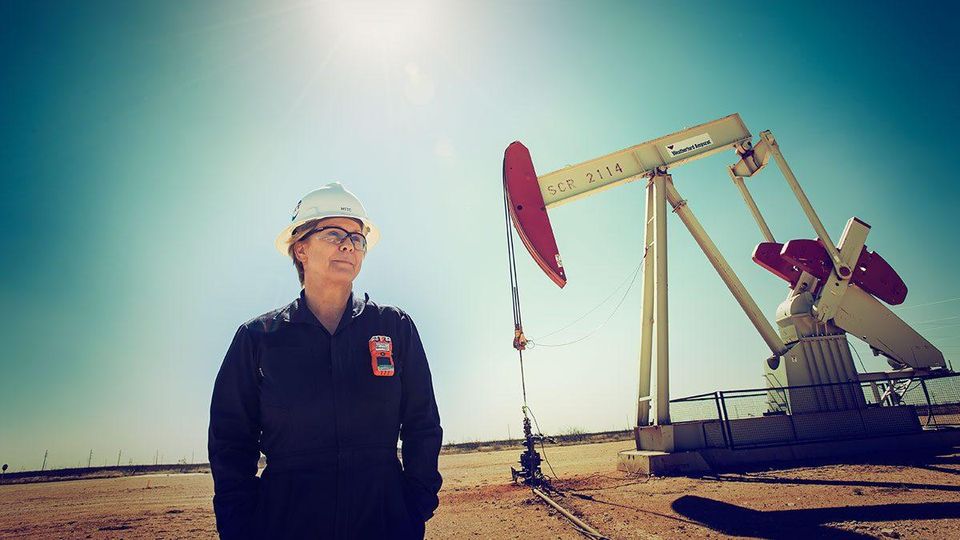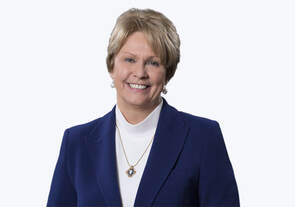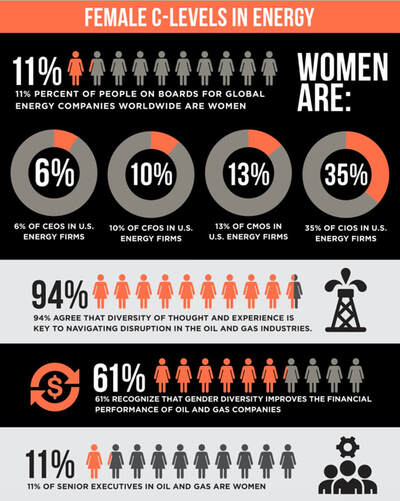Vicki Hollub was the first person in her Alabama high school to make all-state playing the French Horn. So, she figured would be a music major in college and one day earn a spot in one of the nation’s premier symphonies.
When she got to the University of Alabama, she took a course in mineral engineering.
“I had an opportunity in that course to go out on a drilling rig,” she says in a video for her alma mater. “When I got to the drilling rig and were pulling the equipment out, it was so amazing and so exciting, that that’s what shaped my view of what I wanted to be — I knew I wanted to go into the oil industry and be a petroleum engineer.”
She would go on to work on oil rigs in Mississippi and then work her way up in management and technical positions at oil companies, including two decades at Occidental Petroleum.
And in 2016, Hollub became the first female CEO of a major international oil company, the Texas-based Oxy — its stock ticker symbol — overseeing a company of 38,000 employees who were producing 650,000 barrels of oil a day.
Then last year, she pledged that Occidental would become the first major oil company in the world to become carbon neutral.
“I’m thinking about the long term for our shareholders,” Hollub told the Financial Times in Houston. “We believe if you’re not addressing these (climate) issues today, you’re going to be behind the game.”
Her strategy to go carbon neutral involves capturing greenhouse gases equivalent to all the emissions arising from its operations, its supply chain and the use of the oil and gas that it produces.
“We feel like that’s the key to sustainability of our business over time,” she said in the Financial Times article. “If you don’t have that, you almost don’t need to be in operation.”
When she got to the University of Alabama, she took a course in mineral engineering.
“I had an opportunity in that course to go out on a drilling rig,” she says in a video for her alma mater. “When I got to the drilling rig and were pulling the equipment out, it was so amazing and so exciting, that that’s what shaped my view of what I wanted to be — I knew I wanted to go into the oil industry and be a petroleum engineer.”
She would go on to work on oil rigs in Mississippi and then work her way up in management and technical positions at oil companies, including two decades at Occidental Petroleum.
And in 2016, Hollub became the first female CEO of a major international oil company, the Texas-based Oxy — its stock ticker symbol — overseeing a company of 38,000 employees who were producing 650,000 barrels of oil a day.
Then last year, she pledged that Occidental would become the first major oil company in the world to become carbon neutral.
“I’m thinking about the long term for our shareholders,” Hollub told the Financial Times in Houston. “We believe if you’re not addressing these (climate) issues today, you’re going to be behind the game.”
Her strategy to go carbon neutral involves capturing greenhouse gases equivalent to all the emissions arising from its operations, its supply chain and the use of the oil and gas that it produces.
“We feel like that’s the key to sustainability of our business over time,” she said in the Financial Times article. “If you don’t have that, you almost don’t need to be in operation.”
The Anadarko Deal
She is particularly admired among friends and foes alike for her eleventh-hour, $55 billion takeover last year of Anadarko Petroleum Corp., which owned one of the largest untapped acreages in the Texas Permian Basin. Some believe the massive sedimentary basin in western Texas and southeastern New Mexico — stacked with reservoirs of limestone, sandstone and shale — could eventually become the world’s most productive oil field. It has contributed to making the United States one of the world’s largest exporters of oil and gas.
Anadarko first turned down Occidental in favor of a lower bid from Chevron Corp., in part because they didn’t believe Hollub could win shareholder approval for the purchase that also came with a ton of debt.
But this is how she eventually convinced them, according to this excerpt from a July 1, 2019, story in Quartz:
From an Oxy perspective, Hollub believed that an Anadarko deal would be “transformational.” She calculated it would save the two companies $3.5 billion in costs each year, combining infrastructure and operational resources. A Chevron acquisition, in contrast, would save just $1 billion, according to Chevron’s own estimates. And beyond the savings, Hollub was confident that Oxy’s superior technical knowledge would wring more oil out of Anadarko’s oilfields than the reserves it showed on its books.
“She sees an upside opportunity that’s not obvious to others,” says Julio Friedmann, a senior research scholar at Columbia University and a geologist who has previously worked for ExxonMobil and the US government. “It’s certainly not going to be obvious to an analyst of a conventional bank on Wall Street.”
Hollub thought that if she could decrease the proportion of the offer that was in stock—her company initially proposed 60% stock, 40% cash—she wouldn’t need shareholders to vote yes.
So she flew to Omaha, pitched the deal to Warren Buffett, and came away with a $10 billion investment from Berkshire Hathaway Inc. (Buffett got high guaranteed dividends on preferred shares.) Then she went to France and presold Anadarko’s African assets, which included a liquefied natural gas project in Mozambique, to Total SA for an additional $8.8 billion. With what was now a 78% cash bid, Anadarko reversed course and accepted Hollub’s offer. The move consolidated Occidental’s position as the top producer in the Permian Basin, the world’s biggest shale field.
But it isn’t all good news for Oxy.
Its stock is trading near a 10-year low. At its annual shareholder meeting, T. Rowe Price, Oxy’s sixth largest shareholder, and Matrix Asset Advisors made it clear they didn’t like the deal by voting against the re-election of the board. Activist investor Carl Ichan, who owns nearly 5% of Oxy, has sued the company for what he calls a “fundamentally misguided” and “hugely overpriced” deal. He is looking to scupper the deal before anti-trust regulators approve the takeover.
Those who know Hollub say she will take the same determined approach to winning over her shareholders, even if in the end she denied them a vote on the deal. She insists, for example, that Oxy will continue to provide generous dividends. “She has her eye on shareholder value,” says Friedmann. “That’s what gets her up in the morning.”
Indeed, “I get emails from those guys who were on the drilling rigs with me, who were training me back then, and who are now retired, saying ‘Vicki, please do not cut the dividend. I’m putting my grandkids through school, I need this dividend,'” Hollub told Jason Grumet, president of the Bipartisan Policy Center.
“While our directors are charged with thinking about the bigger investors, I am dealing with our smaller investors and I care about them. I care about the guys that helped me get to where I am today.”
Hollub and Grumet sit on the Carbon Capture Coalition, a new group of private sector CEOs, labor, NGO, philanthropic leaders and former state and federal officials committed to carbon capture technology development. The goal is to capture carbon dioxide either from industry or from the air, and sequester it underground or in products—reducing the amount of greenhouse gases dumped in the atmosphere. Almost every climate model predicts that these technologies will be needed at large scale if the world is to cut emissions to zero at a reasonable cost.
She is particularly admired among friends and foes alike for her eleventh-hour, $55 billion takeover last year of Anadarko Petroleum Corp., which owned one of the largest untapped acreages in the Texas Permian Basin. Some believe the massive sedimentary basin in western Texas and southeastern New Mexico — stacked with reservoirs of limestone, sandstone and shale — could eventually become the world’s most productive oil field. It has contributed to making the United States one of the world’s largest exporters of oil and gas.
Anadarko first turned down Occidental in favor of a lower bid from Chevron Corp., in part because they didn’t believe Hollub could win shareholder approval for the purchase that also came with a ton of debt.
But this is how she eventually convinced them, according to this excerpt from a July 1, 2019, story in Quartz:
From an Oxy perspective, Hollub believed that an Anadarko deal would be “transformational.” She calculated it would save the two companies $3.5 billion in costs each year, combining infrastructure and operational resources. A Chevron acquisition, in contrast, would save just $1 billion, according to Chevron’s own estimates. And beyond the savings, Hollub was confident that Oxy’s superior technical knowledge would wring more oil out of Anadarko’s oilfields than the reserves it showed on its books.
“She sees an upside opportunity that’s not obvious to others,” says Julio Friedmann, a senior research scholar at Columbia University and a geologist who has previously worked for ExxonMobil and the US government. “It’s certainly not going to be obvious to an analyst of a conventional bank on Wall Street.”
Hollub thought that if she could decrease the proportion of the offer that was in stock—her company initially proposed 60% stock, 40% cash—she wouldn’t need shareholders to vote yes.
So she flew to Omaha, pitched the deal to Warren Buffett, and came away with a $10 billion investment from Berkshire Hathaway Inc. (Buffett got high guaranteed dividends on preferred shares.) Then she went to France and presold Anadarko’s African assets, which included a liquefied natural gas project in Mozambique, to Total SA for an additional $8.8 billion. With what was now a 78% cash bid, Anadarko reversed course and accepted Hollub’s offer. The move consolidated Occidental’s position as the top producer in the Permian Basin, the world’s biggest shale field.
But it isn’t all good news for Oxy.
Its stock is trading near a 10-year low. At its annual shareholder meeting, T. Rowe Price, Oxy’s sixth largest shareholder, and Matrix Asset Advisors made it clear they didn’t like the deal by voting against the re-election of the board. Activist investor Carl Ichan, who owns nearly 5% of Oxy, has sued the company for what he calls a “fundamentally misguided” and “hugely overpriced” deal. He is looking to scupper the deal before anti-trust regulators approve the takeover.
Those who know Hollub say she will take the same determined approach to winning over her shareholders, even if in the end she denied them a vote on the deal. She insists, for example, that Oxy will continue to provide generous dividends. “She has her eye on shareholder value,” says Friedmann. “That’s what gets her up in the morning.”
Indeed, “I get emails from those guys who were on the drilling rigs with me, who were training me back then, and who are now retired, saying ‘Vicki, please do not cut the dividend. I’m putting my grandkids through school, I need this dividend,'” Hollub told Jason Grumet, president of the Bipartisan Policy Center.
“While our directors are charged with thinking about the bigger investors, I am dealing with our smaller investors and I care about them. I care about the guys that helped me get to where I am today.”
Hollub and Grumet sit on the Carbon Capture Coalition, a new group of private sector CEOs, labor, NGO, philanthropic leaders and former state and federal officials committed to carbon capture technology development. The goal is to capture carbon dioxide either from industry or from the air, and sequester it underground or in products—reducing the amount of greenhouse gases dumped in the atmosphere. Almost every climate model predicts that these technologies will be needed at large scale if the world is to cut emissions to zero at a reasonable cost.
|
An Audience with the Pope
In June 2018, Hollub was among a small group of energy leaders invited to a conference organized by the Vatican. Pope Francis called on them to use alternatives to fossil fuels to meet everyone’s energy needs and mitigate the effects of global warming: "Civilization requires energy, but energy use must not destroy civilization," the pope said in his address, according to the Catholic News Service. He told them: “There is no time to lose,” and that the talent, creativity and experience that had made them successful were the same skills needed to improve the lives of the poor and caring for the environment. “I invite you to be the core of a group of leaders who envision the global energy transition in a way that will take into account all the peoples of the earth, as well as future generations and all species and ecosystems," he said. “This is a challenge of epochal proportions. “Our desire to ensure energy for all must not lead to the undesired effect of a spiral of extreme climate changes due to a catastrophic rise in global temperatures, harsher environments and increased levels of poverty," he said. |
In another excerpt from the Quartz profile, it would appear Hollub was moved by the pope’s plea:
“The meeting materially affected her,” said a close collaborator of Hollub’s, who wanted to remain anonymous. “She came back from Rome and thought differently about her role as a CEO and the value proposition of Oxy to the world.”
Within months of the meeting, Hollub accelerated Oxy’s work on carbon-capture technologies. She joined the global coalition of oil companies—the Oil and Gas Climate Initiative—that’s looking to spend more than $1 billion scaling up the technology. She also created Oxy Low-Carbon Ventures, which quickly made investments in two of the hottest startups in the field: Net Power, a US-based company that has built a power plant that burns natural gas while capturing all the carbon dioxide produced; and Carbon Engineering, a Canadian company that has developed technology to capture carbon dioxide from the air and convert into fuel.
And she’s not a hands-off investor in these companies. “When I ask for help, it happens,” says Steve Oldham, CEO of Carbon Engineering. “There’s none of the big company bureaucratic hassles.” That may involve an Oxy employee helping develop high-level strategy, or sitting in on calls with industrial suppliers to negotiate favorable terms.
“She listens more than most people,” says Bill Brown, CEO of Net Power. “She will ask a question and she will listen for five minutes. She is a CEO who feels like there is more she can learn than she can tell.” In Hollub, Brown says he finds similarities to his former boss, Lloyd Blankfein, Goldman Sachs’ longest-serving chief in 50 years, who retired last year.
“The meeting materially affected her,” said a close collaborator of Hollub’s, who wanted to remain anonymous. “She came back from Rome and thought differently about her role as a CEO and the value proposition of Oxy to the world.”
Within months of the meeting, Hollub accelerated Oxy’s work on carbon-capture technologies. She joined the global coalition of oil companies—the Oil and Gas Climate Initiative—that’s looking to spend more than $1 billion scaling up the technology. She also created Oxy Low-Carbon Ventures, which quickly made investments in two of the hottest startups in the field: Net Power, a US-based company that has built a power plant that burns natural gas while capturing all the carbon dioxide produced; and Carbon Engineering, a Canadian company that has developed technology to capture carbon dioxide from the air and convert into fuel.
And she’s not a hands-off investor in these companies. “When I ask for help, it happens,” says Steve Oldham, CEO of Carbon Engineering. “There’s none of the big company bureaucratic hassles.” That may involve an Oxy employee helping develop high-level strategy, or sitting in on calls with industrial suppliers to negotiate favorable terms.
“She listens more than most people,” says Bill Brown, CEO of Net Power. “She will ask a question and she will listen for five minutes. She is a CEO who feels like there is more she can learn than she can tell.” In Hollub, Brown says he finds similarities to his former boss, Lloyd Blankfein, Goldman Sachs’ longest-serving chief in 50 years, who retired last year.
The Davos Dividend
UN Secretary-General António Guterres has called on world leaders to commit to reduce greenhouse gas emissions by 45% over the next decade — and to net zero emissions by 2050.
“The best science, according to the Intergovernmental Panel on Climate Change, tells us that any temperature rise above 1.5 degrees will lead to major and irreversible damage to the ecosystems that support us,” Guterres told the Climate Action Summit in New York last September. “Science tells us that on our current path, we face at least 3-degrees Celsius of global heating by the end of the century. “The climate emergency is a race we are losing, but it is a race we can win.”
During a panel discussion during the 2019 meeting of the World Economic Forum in Davos about the energy transition, Hollub explained how carbon-capture technology can play its part in cutting emissions. The other panelists weren’t so sure, noting that apart from Oxy, other oil companies haven’t walked the talk about scaling up carbon-capture technology, which still depends on government subsidies to be profitable.
“There was a time when nobody would have thought that we could produce enough wind power,” Hollub countered. “There was a time when nobody expected to make solar affordable and reliable — that’s happened.”
Hollub told the panelists there are no fundamental reasons why it can’t be done. It’s just that, so far, there haven’t been the right incentives in place to make the technology cheaper.
“Many people would like to see the end of fossil fuels. I’m not in that camp. But the camp I’m in is I want to see the end of emissions from fossil fuels. I believe technology will be developed to make that possible,” Hollub said concluding her remarks at Davos. “When our company is in an industry that is threatened, we don’t get stubborn. We get innovative.”
UN Secretary-General António Guterres has called on world leaders to commit to reduce greenhouse gas emissions by 45% over the next decade — and to net zero emissions by 2050.
“The best science, according to the Intergovernmental Panel on Climate Change, tells us that any temperature rise above 1.5 degrees will lead to major and irreversible damage to the ecosystems that support us,” Guterres told the Climate Action Summit in New York last September. “Science tells us that on our current path, we face at least 3-degrees Celsius of global heating by the end of the century. “The climate emergency is a race we are losing, but it is a race we can win.”
During a panel discussion during the 2019 meeting of the World Economic Forum in Davos about the energy transition, Hollub explained how carbon-capture technology can play its part in cutting emissions. The other panelists weren’t so sure, noting that apart from Oxy, other oil companies haven’t walked the talk about scaling up carbon-capture technology, which still depends on government subsidies to be profitable.
“There was a time when nobody would have thought that we could produce enough wind power,” Hollub countered. “There was a time when nobody expected to make solar affordable and reliable — that’s happened.”
Hollub told the panelists there are no fundamental reasons why it can’t be done. It’s just that, so far, there haven’t been the right incentives in place to make the technology cheaper.
“Many people would like to see the end of fossil fuels. I’m not in that camp. But the camp I’m in is I want to see the end of emissions from fossil fuels. I believe technology will be developed to make that possible,” Hollub said concluding her remarks at Davos. “When our company is in an industry that is threatened, we don’t get stubborn. We get innovative.”





